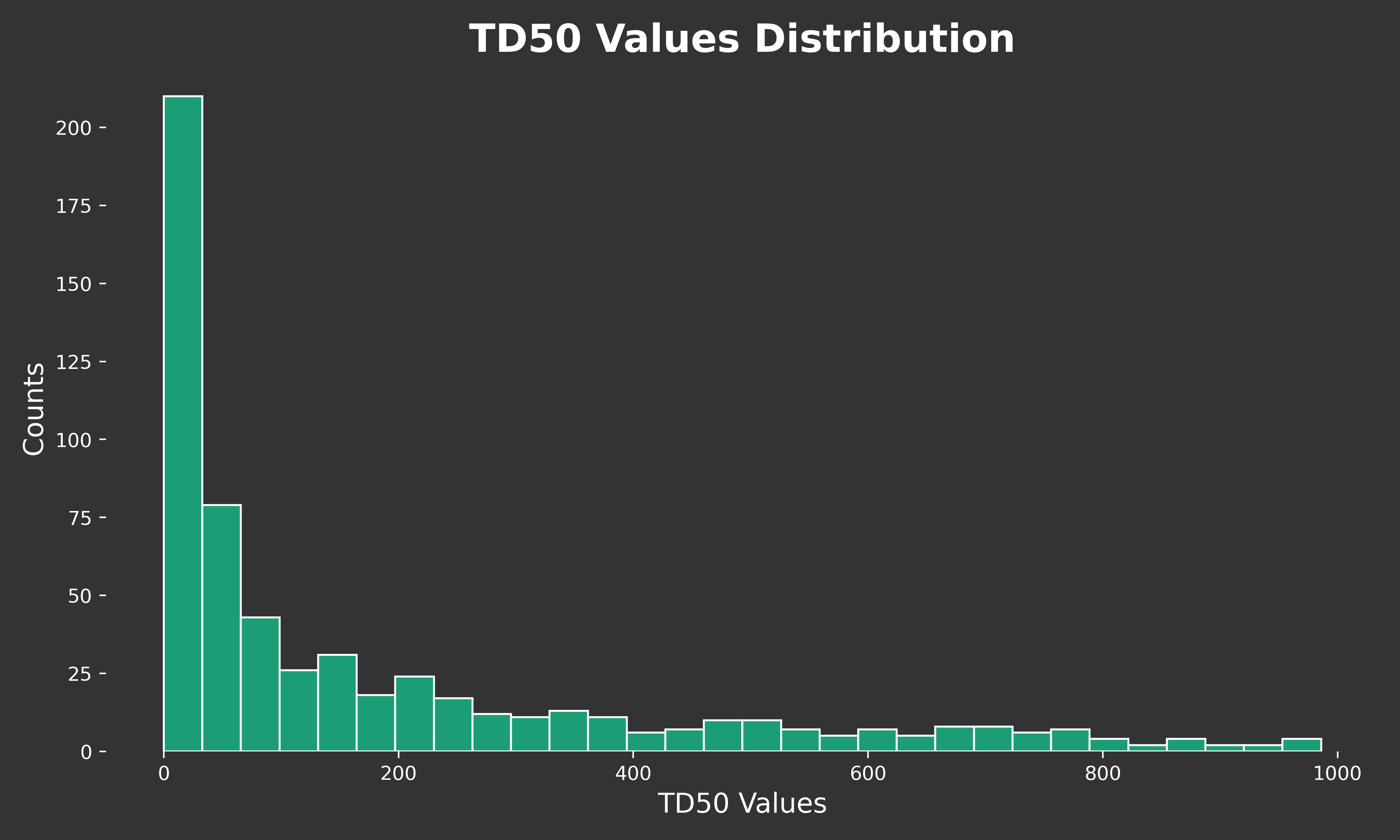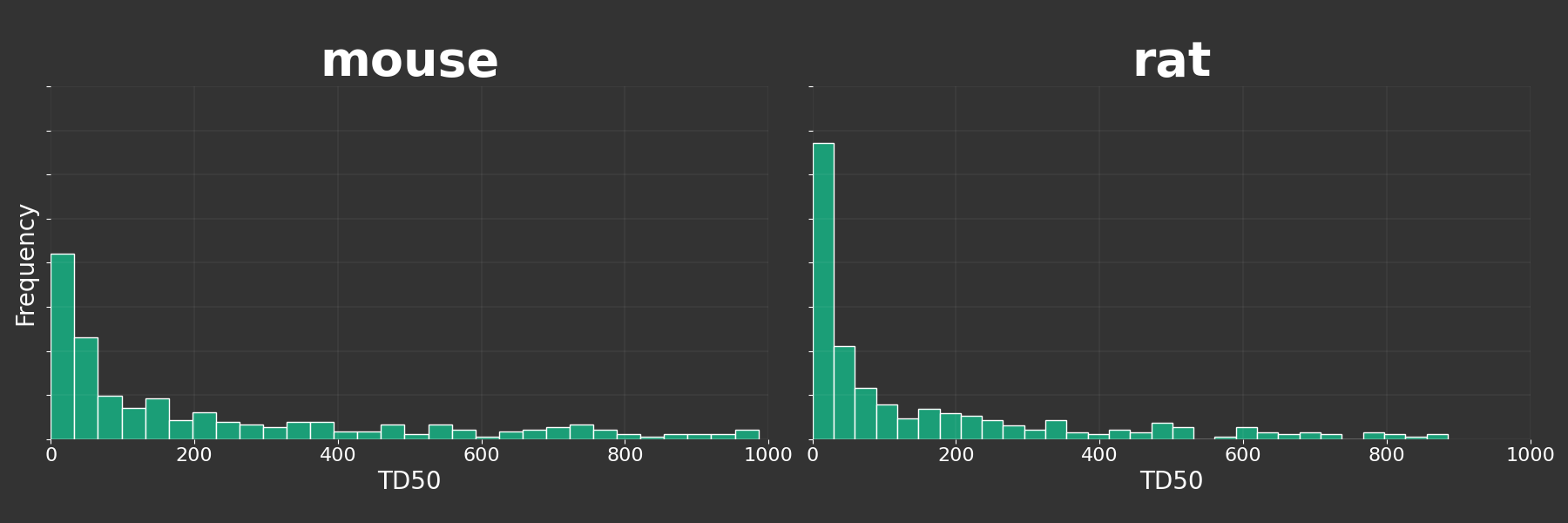Working with CPDB in python - Notebook
The below is the full python notebook for the post Working with CPDB in python.
Setup
python
import biobricks as bb
import pyspark
import pyspark.sql.functions as F
import matplotlib.pyplot as plt
import numpy as np
import seaborn as sns
cpdb = bb.assets('cpdb')
spark = pyspark.sql.SparkSession.builder.getOrCreate()
## build a table of chemicals, routes, species, and td50
ncintp = spark.read.parquet(cpdb.ncintp_parquet)
species = spark.read.parquet(cpdb.species_parquet)
route = spark.read.parquet(cpdb.route_parquet)
sdf = ncintp.join(species, 'species').select('chemcode','species','spname','route','td50')
sdf = sdf.join(route, 'route').select('chemcode','species','spname','rtename','td50')
## take the minimum td50 for each chemical
sdf = sdf.groupBy('chemcode','spname','rtename').agg(F.expr('min(td50)').alias('td50'))
## filter by td50 < 10000 and rtename in gavage, diet or inhalation
sdf = sdf.filter(sdf['td50'] < 1000)
sdf = sdf.filter(sdf['rtename'].isin('gavage', 'diet', 'inhalation'))
## count entries for each species and route
sdf.groupby('spname','rtename').count().sort(F.col('count').desc()).show()
df = sdf.toPandas() #data frame with chemcode, species, route, and numeric td50
Now that we have a pandas dataframe we can build some plots.
TD50 CHART
python
def td50_chart():
# Creating the histogram with the updated data
fig, ax = plt.subplots(figsize=(10, 6))
# Plotting the histogram with all bars in greenish color
ax.hist(df['td50'], bins=30, color="#1b9e77", edgecolor='white')
# Setting the title and labels
ax.set_title('TD50 Values Distribution', fontsize=20, color='white', fontweight='bold')
ax.set_xlabel('TD50 Values', fontsize=14, color='white')
ax.set_ylabel('Counts', fontsize=14, color='white')
# Setting the theme
ax.set_facecolor('#333333')
fig.patch.set_facecolor('#333333')
ax.tick_params(axis='x', colors='white')
ax.tick_params(axis='y', colors='white')
# Removing the frame
for spine in ax.spines.values():
spine.set_visible(False)
# Adjusting the layout
plt.tight_layout()
plt.savefig('static/images/2024-03-12-cpdb/TD50_distribution.png', format='png', dpi=400)
td50_chart()
Build a plot for mice and rats
python
def species_analysis():
colnames = df['spname'].unique()
g = sns.FacetGrid(df, col='spname', col_wrap=2, height=6, aspect=1.5, sharex=False, sharey=True)
# Map the histogram plot to the FacetGrid
g.map(plt.hist, 'td50', bins=30, color="#1b9e77", edgecolor='white', density=True)
# Customize the plot
g.set_titles(col_template='{col_name}', fontsize=40, color='green', fontweight='bold')
g.set_xlabels('TD50', color='white', fontsize=20)
g.set_ylabels('Frequency', color='white', fontsize=20)
g.set_xticklabels(fontsize=16, color='white')
g.set_yticklabels(fontsize=16, color='white')
g.set(xlim=(0, 1000))
# Adjust subplot parameters to ensure the background is consistently dark
g.fig.subplots_adjust(wspace=0.05) # Reduce space between subplots
g.fig.patch.set_facecolor('#333333') # Set the figure background to dark
for ax, title in zip(g.axes.flat,df['spname'].unique()):
ax.set_title(title, fontsize=40, color='white', fontweight='bold') # Adjust font size here
# Remove the frame from both subplots
for ax in g.axes.flat:
ax.tick_params(colors='white', which='both')
ax.set_facecolor('#333333')
for spine in ax.spines.values():
spine.set_visible(False)
# Add a subtle white grid
ax.grid(color='white', linestyle='-', linewidth=0.2, alpha=0.3)
# Adjust the layout to fit the shared title and ensure consistency
g.fig.tight_layout(rect=[0, 0.03, 1, 0.95])
g.fig.savefig('static/images/2024-03-12-cpdb/TD50_distribution_mouse_rat_dark_bg.png', format='png', facecolor=g.fig.get_facecolor(), edgecolor='none')
species_analysis()
Build a histogram for each route
python
def route_analysis():
# Create a FacetGrid
g = sns.FacetGrid(df, col='rtename', col_wrap=3, height=6, aspect=1.5, sharex=False, sharey=True)
# Map the histogram plot to the FacetGrid
g.map(plt.hist, 'td50', bins=30, color="#1b9e77", edgecolor='white', density=True)
# Customize the plot
g.set_titles(col_template='{col_name}', fontsize=50, color='white', fontweight='bold')
g.set_xlabels('TD50', color='white')
g.set_ylabels('Frequency', color='white')
g.set_xlabels('TD50', color='white', fontsize=20)
g.set_ylabels('Frequency', color='white', fontsize=20)
g.set_xticklabels(fontsize=16, color='white')
g.set_yticklabels(fontsize=16, color='white')
g.set(xlim=(0, 1000))
# Adjust subplot parameters to ensure the background is consistently dark
g.fig.subplots_adjust(wspace=0.05) # Reduce space between subplots
g.fig.patch.set_facecolor('#333333') # Set the figure background to dark
for ax, title in zip(g.axes.flat,df['rtename'].unique()):
ax.set_title(title, fontsize=40, color='white', fontweight='bold') # Adjust font size here
# Remove the frame from both subplots
for ax in g.axes.flat:
ax.tick_params(colors='white', which='both')
ax.set_facecolor('#333333')
for spine in ax.spines.values():
spine.set_visible(False)
# Add a subtle white grid
ax.grid(color='white', linestyle='-', linewidth=0.2, alpha=0.3)
# Set a common/shared title for the subplots
# g.fig.suptitle('TD50 Values Distribution', fontsize=24, color='white', fontweight='bold', va='center')
# Adjust the layout to fit the shared title and ensure consistency
g.fig.tight_layout(rect=[0, 0.03, 1, 0.95])
g.fig.savefig('static/images/2024-03-12-cpdb/TD50_distribution_route_dark_bg.png', format='png', facecolor=g.fig.get_facecolor(), edgecolor='none')
# Show the plot
plt.show()
route_analysis()
Get Most Toxic Examples
python
chemname = spark.read.parquet(cpdb.chemname_parquet)
intp = spark.read.parquet(cpdb.ncintp_parquet)
min_td50 = intp.groupBy('chemcode').agg(F.min('td50').alias('td50'))
df = min_td50.join(chemname,'chemcode').sort(F.col('td50').asc())
df.select('name','td50').show(10,truncate=False)
# +-----------------------------------+-------+
# |name |td50 |
# +------------------------------------+-------+
# |2,3,7,8-TETRACHLORODIBENZO-p-DIOXIN |1.21E-5|
# |HCDD MIXTURE |5.96E-4|
# |o-CHLOROBENZALMALONONITRILE |0.00649|
# |OZONE |0.0156 |
# |RIDDELLIINE |0.0267 |
# |THIO-TEPA |0.0332 |
# |OCHRATOXIN A |0.0579 |
# |POLYBROMINATED BIPHENYL MIXTURE |0.0645 |
# |COBALT SULFATE HEPTAHYDRATE |0.0826 |
# |LASIOCARPINE |0.102 |
# +------------------------------------+-------+


